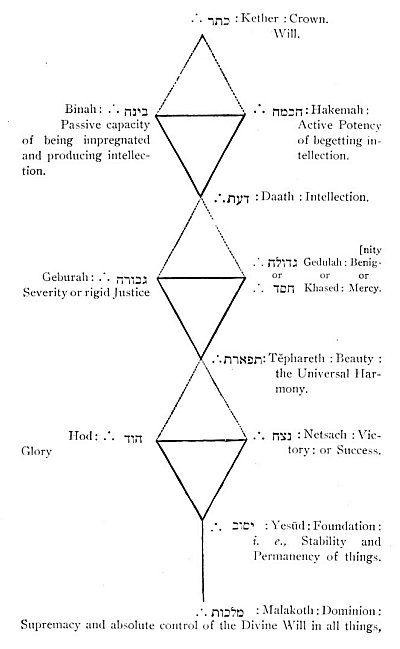Naturally, therefore, two substances of opposite natures were imagined, to each of which the world was in turn subjected, one contributing to its felicity and the other to its misfortune. Light multiplied its enjoyments; Darkness despoiled it of them: the former was its friend, the latter its enemy. To one all good was attributed; to the other all evil; and thus the words “Light” and “Good” became synonymous, and the words “Darkness” and “Evil.” It seeming that Good and Evil could not flow from one and the same source, any more than could Light and Darkness, men naturally imagined two Causes or Principles, of different natures and opposite in their effects, one of which shed Light and Good, and the other Darkness and Evil, on the Universe.
This distinction of the two Principles was admitted in all the Theologies, and formed one of the principal bases of all religions. It entered as a primary element into the sacred fables, the cosmogonies and the Mysteries of antiquity. “We are not to suppose,” says Plutarch, “that the Principles of the Universe are inanimate bodies, as Democritus and Epicurus thought; nor that a matter devoid of qualities is organized and arranged by a single Reason or Providence, Sovereign over all things, as the Stoics held; for it is not possible that a single Being, good or evil, is the cause of all, inasmuch as God can in nowise be the cause of any evil. The harmony of the Universe is a combination of contraries, like the strings of a lyre, or that of a bow, which alternately is stretched and relaxed.” “The good,” says Euripides, “is never separated from the Evil. The two must mingle, that all may go well.” And this opinion as to the two principles, continues Plutarch, “is that of all antiquity. From the Theologians and Legislators it passed to the Poets and Philosophers. Its author is unknown; but the opinion itself is established by the traditions of the whole human race, and consecrated in the mysteries and sacrifices both of the Greeks and Barbarians, wherein was recognized the dogma of
p. 661
opposing principles in nature, which, by their contrariety, produce the mixture of good and evil. We must admit two contrary causes, two opposing powers, which lead, one to the right and the other to the left, and thus control our life, as they do the sublunary world, which is therefore subject to so many changes and irregularities of every kind. For if there can be no effect without a cause, and if the Good cannot be the cause of the Evil, it is absolutely necessary that there should be a cause for the Evil, as there is one for the Good.” This doctrine, he adds, has been generally received among most nations, and especially by those who have had the greatest reputation for wisdom. All have admitted two gods, with different occupations, one making the good and the other the evil found in nature. The former has been styled “God,” the latter “Demon.” The Persians, or Zoroaster, named the former Ormuzd and the latter Ahriman; of whom they said one was of the nature of Light, the other of that of Darkness. The Egyptians called the former Osiris, and the latter Typhon, his eternal enemy.
The Hebrews, at least after their return from the Persian captivity, had their good Deity, and the Devil, a bad and malicious Spirit, ever opposing God, and Chief of the Angels of Darkness, as God was of those of Light. The word “Satan” means, in Hebrew, simply, “The Adversary.”
The Chaldæans, Plutarch says, had their good and evil stars. The Greeks had their Jupiter and Pluto, and their Giants and Titans, to whom were assigned the attributes of the Serpent with which Pluto or Serapis was encircled, and the shape whereof was assumed by Typhon, Ahriman, and the Satan of the Hebrews. Every people had something equivalent to this.
The People of Pegu believe in two Principles, one author of Good and the other of Evil, and strive to propitiate the latter, while they think it needless to worship the former, as he is incapable of doing evil. The people of Java, of the Moluccas, of the Gold Coast, the Hottentots, the people of Teneriffe and Madagascar, and the Savage Tribes of America, all worship and strive to avert the anger and propitiate the good-will of the Evil Spirit.

Moe is the founder of GnosticWarrior.com. He is a father, husband, author, martial arts black belt, and an expert in Gnosticism, the occult, and esotericism.






